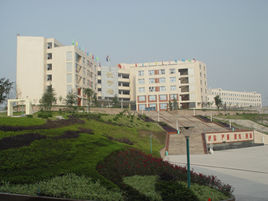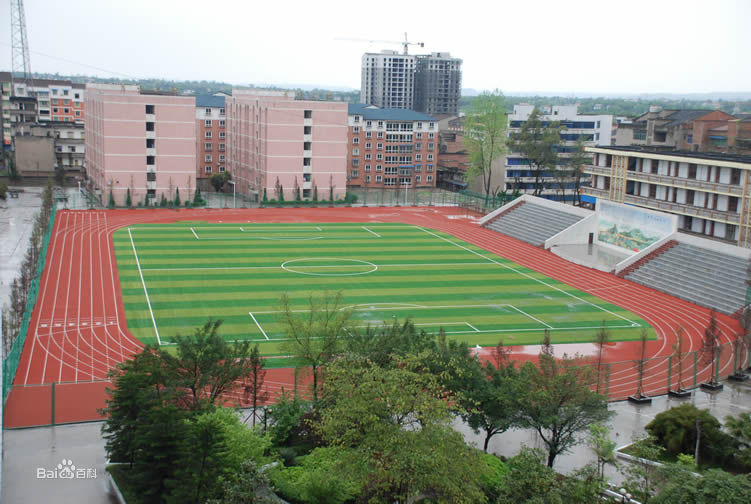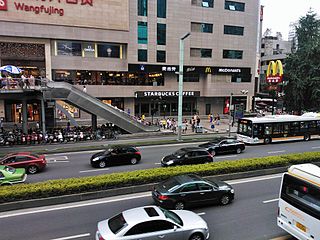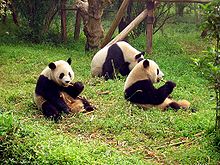Sichuan Guangan Experimental Middle School
Guang'an ,Sichuan Province
Guang'an is a prefecture-level city in eastern Sichuan province. It is most famous as the birthplace of China's former paramount leader Deng Xiaoping. Guang'an lies between the hills of central Sichuan and the gorges area of the east. Because of its strategic location, it is called the "Gateway to Eastern Sichuan".
Its population in 2000 was 1,093,103.
Guang'an is located on a gradually rising section along the edge of the Sichuan Basin. The area is 6,344 km2 (2,449 sq mi). The eastern part of Guang'an is mountainous, the central part hilly, and the western part is relatively flat. The elevation ranges from only 185 to 1704 meters above sea-level. The main rivers are the Qu through the center of the area and the Jialing through the west.
The climate is temperate and the weather is monsoonal. The average temperature is between 15.8° and 17.7°C. Winters are mild and summers are hot. The average rainfall is between 1000–1500 mm. The frost-free period lasts 310–324 days. Winter and spring have relatively little rain while in summer there are heavy rain showers. Autumns have almost constant rain and light wind.
sichuan at a closer look Panda in Chengdu


School at a closer look
An Introduction to Si Chuan Province
Sichuan,formerly romanized Szechuan, is a province in southwest China occupying most of the Sichuan Basin between the Himalayas on the west, the Daba Mountains in the north, and the Yungui Plateau to the east. Sichuan's capital city is Chengdu.
In antiquity, Sichuan was the home of the ancient states of Ba and Shu. Their conquest by Qin strengthened it and paved the way for the First Emperor's unification of China under the Qin Dynasty. During the Three Kingdoms era, Liu Bei's Shu was based in Sichuan. The area was devastated in the 17th century by Zhang Xianzhong's rebellion and the area's subsequent Manchu conquest, but recovered to become one of China's most productive areas by the 19th century. During the Second World War, Chongqing served as the temporary capital of the Republic of China, making it the focus of Japanese bombing. It was one of the last mainland areas to fall to the Communists during the Chinese Civil War and was divided into four parts from 1949 to 1952, with Chongqing restored two years later. It suffered gravely during the Great Chinese Famine of 1959–61 but remained China's most populous province until Chongqing Municipality was again separated from it in 1997.
The people of Sichuan speak a unique form of Mandarin, which took shape during the area's repopulation under the Ming. The family of dialects is now spoken by about 120 million people, which would make it the 10th most spoken language in the world if counted separately. The area's warm damp climate long caused Chinese medicine to advocate spicy dishes; the native Sichuan pepper was supplemented by Mexican chilis during the Columbian Exchange to form modern Sichuan cuisine, whose dishes—including Kung Pao chicken and Mapo tofu—have become staples around the world.
Abbreviation: Chuan 川or Shu蜀
Capital: Chengdu
Area: Approximately 480,000 square kilometers
Population: 84.74 million
Location: In southwest China and the upper reaches of the Yangtze River
English Teachers Number required: 2 Posts
Requirements: BA ,TESOL and some teaching experience preferred
Contract Period: 1st Mar, 2025 - 15th Jan, 2026
1st Sep, 2024 - 15th Jul, 2025
Monthly Salary: 10000 RMB or above
Teaching hours: 16-18 classes per week
Age of students: Primary School -Senior Middle School Students
Free meals: the school will provide free meals to the teacher
Accommodation:provide good accommodation, telephone, air-condition ,Color TV, refrigerator, A-Z miscellaneous items (bedding, blanket, pillow, towel, sleeper, etc)
Internet access (Free): computer with internet access in the apartment.
Number of students per class in the centre: 20
Paid Holiday
Two days off per week on Saturday and Sunday.
*National day in October (7 days), Christmas in December (1 day) and New Year in Januar(2 days) . Summer Holiday (60 days), *Labor Day in May (7 days)
*The common practice in China for golden week holidays is such that the employee will have 7 consecutive days off. (3 days paid holiday, 2 weekend days, 2 extra days to be compensated for by employee working on weekends either before or after the golden week).
During Summer holiday ,the school will pay 50% salary per month
Other Perks: Free Mandarin lessons and free trip in Guang'an city
Work permit : The school will provide work permit for China at no cost to the teacher.
Air-ticket Reimbursement: When foreign teacher arrive at school, an one way air-ticket reimbursement will be made.
Closest Airport: Chengdu Shuangliu International Airport

